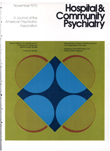A Survey of Factors Related to Mental Hospital Readmissions
Abstract
The authors followed up 107 patients selected at random from those dischargedfrom a southern state mental hospital in fiscal year 1972-73. They attempted to differentiate those who were readmitted to the hospital from those who were not on the basis of52factors, both personal and environmental, and also compared those who misused alcohol with those who did not. In their sample, 36 of the patients returned to the institution, and 71 did not. One of the findings was that in both the total sample and in the nonalcoholic subsample, those readmitted more often received income from sources other than their own employment or the employment of someone in their household. They also tended to be single, separated, or divorced. In both the alcoholic and nonalcoholic subsamples, those readmitted reported more contacts with the community mental health center after their discharge than those not readmitted. In the total sample, the readmitted patients engaged in fewer leisure-time activities and were more likely to report a drinking problem.
Access content
To read the fulltext, please use one of the options below to sign in or purchase access.- Personal login
- Institutional Login
- Sign in via OpenAthens
- Register for access
-
Please login/register if you wish to pair your device and check access availability.
Not a subscriber?
PsychiatryOnline subscription options offer access to the DSM-5 library, books, journals, CME, and patient resources. This all-in-one virtual library provides psychiatrists and mental health professionals with key resources for diagnosis, treatment, research, and professional development.
Need more help? PsychiatryOnline Customer Service may be reached by emailing [email protected] or by calling 800-368-5777 (in the U.S.) or 703-907-7322 (outside the U.S.).



